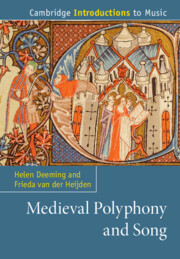Book contents
- Cambridge Introductions to Music
- Medieval Polyphony and Song
- Copyright page
- Dedication
- Contents
- Figures
- Tables
- Boxes
- Music Examples
- Acknowledgements
- Chapter 1 Introduction and Historical Outline
- Chapter 2 Monastic Centres in the Early Middle Ages
- Chapter 3 Court and Cloister in Aquitaine and Occitania
- Chapter 4 Paris: City, Cathedral, and University
- Chapter 5 Courts and Cities in Northern France
- Chapter 6 Scribes, Scholars, and Secretaries in Fourteenth-Century France
- Chapter 7 England after the Norman Conquest
- Chapter 8 On the Shores of the Mediterranean: Italy, Sicily, and the Iberian Peninsula
- Chapter 9 The German- and Dutch-Speaking Lands
- Chapter 10 Medievalisms: Modern Encounters with Medieval Polyphony and Song
- Glossary
- Bibliography
- Discography
- Index
- Cambridge Introductions to Music
- References
Chapter 2 - Monastic Centres in the Early Middle Ages
Published online by Cambridge University Press: 27 April 2023
- Cambridge Introductions to Music
- Medieval Polyphony and Song
- Copyright page
- Dedication
- Contents
- Figures
- Tables
- Boxes
- Music Examples
- Acknowledgements
- Chapter 1 Introduction and Historical Outline
- Chapter 2 Monastic Centres in the Early Middle Ages
- Chapter 3 Court and Cloister in Aquitaine and Occitania
- Chapter 4 Paris: City, Cathedral, and University
- Chapter 5 Courts and Cities in Northern France
- Chapter 6 Scribes, Scholars, and Secretaries in Fourteenth-Century France
- Chapter 7 England after the Norman Conquest
- Chapter 8 On the Shores of the Mediterranean: Italy, Sicily, and the Iberian Peninsula
- Chapter 9 The German- and Dutch-Speaking Lands
- Chapter 10 Medievalisms: Modern Encounters with Medieval Polyphony and Song
- Glossary
- Bibliography
- Discography
- Index
- Cambridge Introductions to Music
- References
Summary
Chapter 2 explores the music produced in the monastic institutions of ninth- to eleventh-century Europe. Describing the context of the Carolingian Empire, and the renaissance of learning, literacy, and writing that it brought about, we look at some of the earliest examples of musical notation from this vast region of Europe. We examine the Latin songs, or versus, produced in monasteries, charting their wide range of themes and their possible functions in monastic life. Our earliest evidence of polyphonic singing in church comes from music theory texts dating from the ninth century onwards: we consider what these texts can tell us about the improvised practice of organum (or parallel organum) singing, and provide a practical exercise for readers to try improvising organum themselves. Further music theory texts from the tenth and eleventh centuries document the changing approaches to organum singing over the period, and finally we consider how music theory related to actual practice, by looking at the first surviving examples of practical polyphony from medieval Europe.
Keywords
- Type
- Chapter
- Information
- Medieval Polyphony and Song , pp. 11 - 32Publisher: Cambridge University PressPrint publication year: 2023

